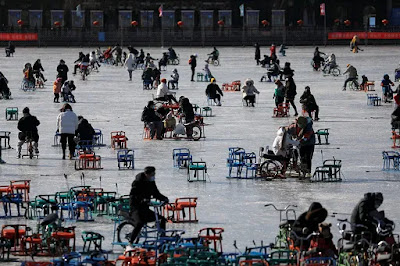HONG KONG - Stock markets sank Monday on growing concerns that lockdowns in China aimed at fighting a worsening Covid outbreak could threaten the country's economy and global supply chains.
The losses extended a sell-off across the world last week fuelled by comments from Federal Reserve boss Jerome Powell indicating officials will hike interest rates by half a point next month and possibly several times more by year's end.
China's struggle to get a grip on a Covid outbreak that has forced Shanghai -- the country's biggest city -- into lockdown and dealing a blow to demand.
Officials in the finance hub reported 51 deaths Monday, its highest daily toll despite weeks of strict containment measures, while Beijing warned of a "grim" situation as infections rise.
The lockdowns will "cause a logistical problem that's going to affect not just China but also the rest of the world", OANDA's Jeffrey Halley told Bloomberg TV.
Officials' determination to continue with a zero-Covid policy as well as a lack of government stimulus, "that all points to lower China stocks and we are going to see a weaker yuan going forward".
Investors were already fleeing risk assets as they become worried that the Fed tightening -- to fight inflation at more than 40-year highs -- will knock the pandemic economic recovery off course and dent companies' bottom line.
With earnings season under way, a close eye is being kept on what firms say about the impact on and the outlook for business in light of inflation, forecast rate hikes, supply chain snarls and the Ukraine war.
"Having spent most of the last few weeks trying to put to one side concerns about events in eastern Europe, a slowdown in China, and the increasing risks of what inflation might do to company earnings, as well as consumer incomes, the final straw appears to be a concern about the prospect of a policy mistake by central banks, and a possible recession by the end of the year," said Michael Hewson of CMC Markets.
And Geir Lode, at Federated Hermes, added: "There has been little to avert the investor pessimism as inflation and interest rate expectations start to bite.
"In particular due to the uncertainty of the macro environment, expectations are low with regard to forward estimates and guidance, building on lowered expectations from the previous quarter."
All three main indexes on Wall Street ended more than two percent down Friday, and Asia followed suit with hefty losses.
Hong Kong and Shanghai led the selling, with both markets suffering hefty losses, while Tokyo, Seoul, Singapore, Taipei, Mumbai, Bangkok and Jakarta were also deep in the red.
London, Paris and Frankfurt were sharply lower in the morning.
Sydney and Wellington were closed for holidays.
The hit to demand for energy in China also dragged on crude. WTI fell below $100 a barrel, even as the war in Ukraine hits supplies of the black gold owing to embargoes on Russian exports.
"Oil is rerating lower due to the China consumption hit while the Federal Reserve is raising interest rates to slow down the US economy," said Stephen Innes at SPI Asset Management.
"Those are two gusty headwinds suggesting some oil bulls will give way to recession fears and demand devastation."
On currency markets, the euro was unable to hold a brief rally that came on the back of Emmanuel Macron's victory in France's presidential election, seeing off far-right challenger Marine Le Pen.
Agence France-Presse




















